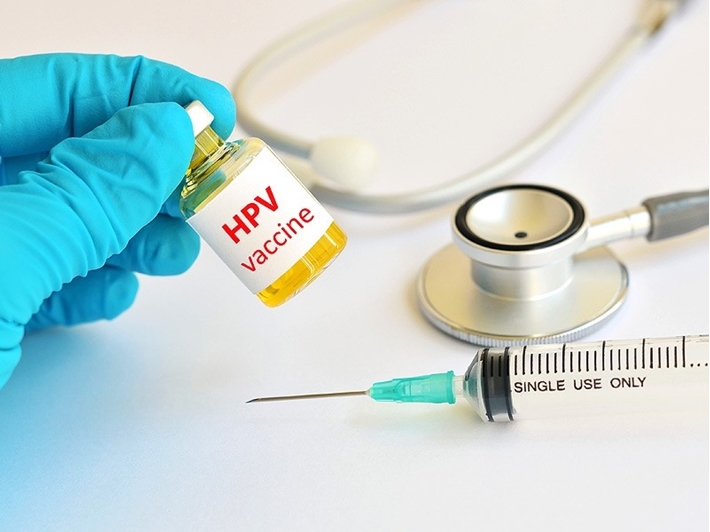Who should and should not have the HPV vaccine?
Cervical cancer is one of the most common cancers in women between the ages of 40 and 60. However, the germ caused by the HPV virus may have quietly existed. Therefore, getting the HPV vaccine right from the beginning is the most effective way for women to actively prevent this dangerous disease.

8/1/2018 2:18:11 PM
1. What is the HPV vaccine?
HPV is the abbreviation for Human Papilloma Virus - a virus that causes papillae in humans. There are more than 100 different types of HPV, but only a handful of viruses are highly carcinogenic. Not everyone who is infected with HPV will get cervical cancer, but in contrast, more than 95% of cervical cancers are caused by the HPV virus.
HPV can be spread from person to person through skin-to-skin contact, sexual contact including vaginal, anal, and oral sex. According to the statistics, the average rate of HPV transmission between men and women through intercourse is 40%. In women, the risk of getting HPV in the first 10 years after sexual intercourse is 25%, in a lifetime up to 80%. HPV doesn’t spread by sitting on the toilet or touching doorknobs.
The HPV vaccine can fight infection by some special types of HPV, specifically, types 16&18 causing cervical cancer and types 6&11 causing genital warts. This vaccine is not required but recommended for women.
The HPV vaccine has been shown to be safe and effective through clinical studies and practical experiment
2. How many types of HPV vaccine are there?
There are 2 types of HPV vaccines used in Vietnam: Gardasil (USA) and Cervarix (Belgium). It has been approved as safe and can reduce the risk of cervical cancer by over 90% and precancerous lesions by over 60%.
The characteristics of these two vaccines are shown in the table below:
|
Type |
Gardasil |
Cervarix |
|
Immunization prevention |
4 types of HPV: 6, 11, 16 and 18 |
2 types of HPV type 16 and 18 |
|
Subject |
Female from 9 - 26 years old |
Female from 10 - 25 years old |
|
Benefit |
Prevention of cervical cancer, vaginal cancer, vulvar cancer, anal cancer and genital warts. |
Prevention of cervical cancer (squamous carcinoma and cervical carcinoma). |
|
Instruction |
|
|
|
Schedule |
Includes 3 shots:
|
Includes 3 shots:
|
According to the vaccine manufacturer's recommendation, it is necessary to inject a full dose and on schedule. In case of delaying, the next additional injection should be given, not necessarily from the beginning, but the time to complete 3 injections should not exceed 2 years.
3. Who should and should NOT get the HPV vaccine
Women aged 9-26 years should get the HPV vaccine before their first sexual interaction to prevent cervical cancer. Because this is the time when the vaccine is most effective. However, married, sexually active, or overage women can still get the HPV vaccine.
The vaccine that prevents HPV infection has an active immune-building mechanism, it is still recommended during sex.
The HPV vaccine is not recommended if:
-
Hypersensitivity to yeast or to any of the vaccine ingredients
-
Have an acute high fever, moderate or severe infection. Get complete treatment to start vaccination.
-
Have thrombocytopenia, a blood clotting disorder or taking blood thinners.
-
Pregnant or breastfeeding.
-
Have been infected with HPV.
4. Do I need testing before cervical cancer vaccination?
If you have not had sex, you can get the HPV vaccine without testing. If you have sex, should go to the gynecological examination. All women should have a health check-up before vaccination to ensure it’s safe.
5. Common side effects of the HPV vaccine
The HPV vaccine has been used widely around the world for many years and it is very safe. However, like many other vaccines, the HPV vaccine can also cause some unwanted allergic reactions, such as:
-
Pain, swelling, itching, and redness at the injection site
-
Low-grade fever
-
Headache, dizziness, fatigue
-
Nausea, vomiting
-
Diarrhea
-
Fainting.
However, these side effects are very rare, so medical experts advise you not to worry too much.
See your doctor for specific advice and early immunizations!
6. Without vaccination, is there a high chance of getting HPV?
If you haven't been vaccinated, you could get HPV if you have the following factors:
-
Unsafe sex
-
Have sex with many partners
-
Direct contact with the open wound of the patient
-
Having a habit of using tobacco or chewing tobacco, weakens the immune system
-
Immune system impairment
-
Poor nutrition, unhealthy eating.
7. Price of the HPV vaccine
Price list of reference cervical cancer vaccination of CarePlus International Clinic System:
|
Type of Vaccine |
Price (VND) |
|
Gardasil (1 shot): not including consultancy |
1.900.000 |
|
Gardasil (3 shots): including examinationa and consultancy fee |
6.000.000 |
CarePlus is an international standard clinic system, a member of Singapore Medical Group (SMG) - a leading healthcare provider in Singapore, with a network of more than 20 specialties and more than 26 rooms. Outpatient health care services at CarePlus are always high quality with excellent medical staff and advanced equipment.
In particular, CarePlus' cervical cancer vaccination service has 3 outstanding advantages:
-
Examination before vaccination: Doctors do health screening before vaccination, ask about health history, immunization allergy status, advise specific vaccines suitable for each customer.
-
Immunization: Use the right medicine, the right type, and quality, follow the immunization procedure of the Ministry of Health.
-
Follow-up after vaccination: Follow up 30 minutes after injection in a sterile area that help customers feel secure and comfortable.
To learn more about the service and precautions when getting the HPV vaccine, please contact the Hotline Hotline: 1800 6116 (Press 2) for advice.
Consulted by Dr. First Degree Specialist. Pham Thi Ngoc Tuyet